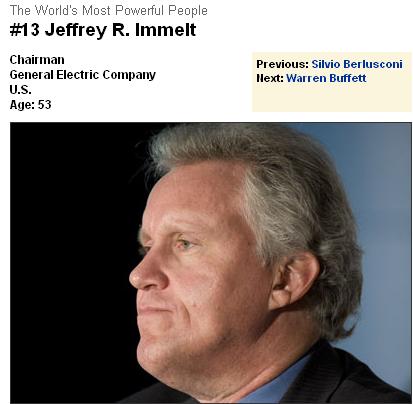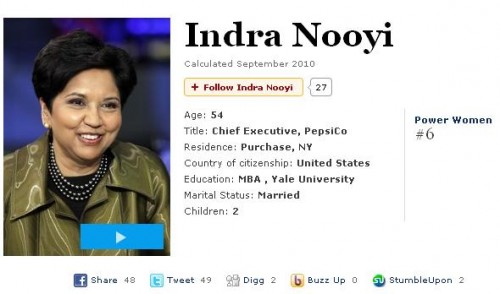Dmitriy T.M. pointed out a post at Jezebel about an odd aspect of the Forbes “Power Women” list. Forbes has a general list of the “world’s most powerful people” (with 67 entrants, 3 of whom are women), as well as one specifically of the world’s 100 most powerful women. Here’s a sample bio from the general list, which is representative of what they all look like (I didn’t include the paragraph below each photo that explains why they’re powerful):
Now let’s check out a profile from the powerful women list:
Notice the difference? Almost all of the women’s profiles, but none of the profiles on the “general” power list, include their marital status (84 do, 16 don’t), and many list how many children they have. It’s fairly common to have a woman listed as married but without any comment about children; I could only find one (Ana Patricia Botin, #38) where she is listed as having children but her marital status isn’t provided, and none who were listed as single (as opposed to married, divorced, or widowed) but having children. (Also, Jenny Goudreau wrote an article about diversity on the list that’s rather interesting.)
To be fair, on some occasions Forbes has included marital/parental information on lists that are dominated by men. Why they didn’t decide to be consistent here, I don’t know. The inconsistency in this case leaves the unfortunate impression that Forbes is endorsing the tendency to see powerful men are individually interesting, while still judging powerful women by their family roles.



Comments 14
MPS — October 8, 2010
In this particular case, the female profile also contains residence and education, so one might argue that it's just generally taking a more informative approach, and that justifies the marital status. Alternatively, listing of education credentials might be see as revealing a perception that powerful women need to "prove more" to justify themselves.
To me, the whole idea of a "most powerful" list seems gender biased. What is meant by "power?" Why should we care? I think the game of rating status is for the most part a game played among men, the purpose of which is to attract women. Just like the game of rating attractiveness is for the most part played among women, the purpose of which to attract men. (There are exceptions like the most powerful female list, and lists of most attractive women made by men -- this is because humans are complex and divorced from their innate urges etc -- but by and large I think it's fair to say men spend much more time thinking about, and trying to improve their social standing, whereas women spend more time thinking about, and trying to improve their appearance, and this imbalance stems from a deeper one, cultural or not, whereby women assess men as mates more based on their social standing, and men assess women as mates more based on their appearance.)
Jake — October 8, 2010
Honestly? They simply were going for a different angle, one that included more info. Women on the general list didn't have that info listed either. Check out ForbesWoman, their entire section on women in high powered management careers. And then come back and find something to nitpick about it.
Sue — October 9, 2010
It's amazing to me that this points like this still have to be made. At least now there are blogs to help.
Pre-Intenet, I used to be the lone reader who would call the newspaper asking why a headline writer had identified an older woman as a "grandmother" when it wasn't relevant (sometimes it wasn't even clear she had grandchildren), or why a philanthropy ran an ad with a picture of one of its past contributors describing her as "beautiful." That was her chief attribute.
The men at the other end of the line always claimed I was the only one who had ever pointed these things out.
But we shouldn't forget that many women also judge other women on their marital and maternity status.
Sue — October 9, 2010
Different, but related point:
I read a blog post in which the writer was complaining that her company had structured an evening for employees "and their spouses." This was right on the invitation. If you didn't have one, you were SOL.
It's offensive in its limited view of world, but also has other effects. The blogger was a black single woman, and it's been well reported that black women in the U.S. tend to marry at much lower rates than women in other groups.
So this you-only-count-if-you-have-a-spouse mindset makes it possible for unmarried women (it's usually not a problem to be a single man) to be excluded from workplace contacts and experiences that might help them get ahead.
abby-wan kenobi — October 11, 2010
It is strange that Forbes decided to include this information in its profiles of powerful women. One could argue that the article was geared in a different direction or it was a more in-depth profile than the general list, but it begs the question - Why?
Why would the two articles need to have a different purpose? Why does the women's list require more personal information? How is marital status more relevant as basic framing information for women than men?
Is it because Forbes readers are more familiar with the men on the general list? Perhaps the men on the list are more famous, or have been profiled extensively in Forbes before. Or maybe Forbes considered the women's list to be more of a human interest piece and wanted to make the women more approachable by letting readers picture them as part of a family. Where we're used to seeing women.
Who knows. I hope Forbes lets us know what led them to make that decision.
Andrew — October 11, 2010
Forbes saw fit to call Michelle Obama the #1 "world's most powerful woman" clearly on the basis of being married to the person atop the unisex list. However, their capsule doesn't bother to address how her proximity to the President confers greater power than, say, the chancellor of Europe's largest economy. Instead, we get a little blurb about how her lightweight (excuse the pun) anti-obesity campaign had more tangible results than Mrs Clinton's early attempt at health reform. Compared to the other women profiled in lower "ranks," such as Oprah, it doesn't look like much of a career record.
And what a missed opportunity! I'd be fascinated to read how a conservative, free-market-fundamentalist magazine explain its metric for determining that the most powerful position a woman in 2010 can occupy is in bed with a powerful man.
(I hope this doesn't scan as Obama-bashing here; from what little I know about Michelle, she seems to be an extraordinary public figure in her own right, whose attributes are much more respectable than being termed powerful.)
oh, right. we don’t need feminism anymore. | diverge — May 5, 2014
[…] want to open it, enabling a rather vicious cycle. Last night, when I finally looked at it, I found this piece at Sociological Images, about Forbes magazine’s list of generally powerful people. There is so much wrong here, I don’t […]
Ali Jaan — December 13, 2025
Nail design https://tropicalsmoothiemenus.com/ is a creative expression where style, color, and detail come together to transform nails into miniature works of art. From minimalist elegance to bold, trend-driven looks, it reflects personal style while evolving with fashion and beauty innovations. Whether for everyday wear or special occasions, nail design blends artistry and precision to enhance confidence and showcase individuality.